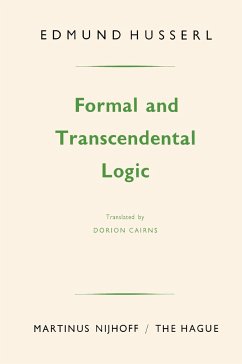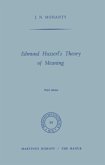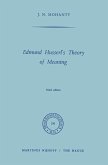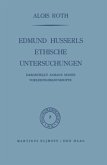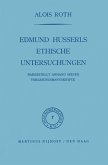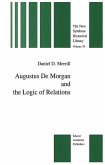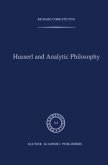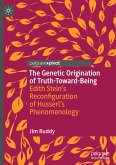- Broschiertes Buch
- Merkliste
- Auf die Merkliste
- Bewerten Bewerten
- Teilen
- Produkt teilen
- Produkterinnerung
- Produkterinnerung
2 called in question, then naturally no fact, science, could be presupposed. Thus Plato was set on the path to the pure idea. Not gathered from the de facto sciences but formative of pure norms, his dialectic of pure ideas - as we say, his logic or his theory of science - was called on to make genuine 1 science possible now for the first time, to guide its practice. And precisely in fulfilling this vocation the Platonic dialectic actually helped create sciences in the pregnant sense, sciences that were consciously sustained by the idea of logical science and sought to actualize it so far as…mehr
Andere Kunden interessierten sich auch für
![Edmund Husserl's Theory of Meaning Edmund Husserl's Theory of Meaning]() J. N. MohantyEdmund Husserl's Theory of Meaning115,99 €
J. N. MohantyEdmund Husserl's Theory of Meaning115,99 €![Edmund Husserl's Theory of Meaning Edmund Husserl's Theory of Meaning]() J. N. MohantyEdmund Husserl's Theory of Meaning123,99 €
J. N. MohantyEdmund Husserl's Theory of Meaning123,99 €![Edmund Husserls ethische Untersuchungen Edmund Husserls ethische Untersuchungen]() A. RothEdmund Husserls ethische Untersuchungen77,99 €
A. RothEdmund Husserls ethische Untersuchungen77,99 €![Edmund Husserls ethische Untersuchungen Edmund Husserls ethische Untersuchungen]() A. RothEdmund Husserls ethische Untersuchungen76,99 €
A. RothEdmund Husserls ethische Untersuchungen76,99 €![Augustus De Morgan and the Logic of Relations Augustus De Morgan and the Logic of Relations]() Daniel D. MerrillAugustus De Morgan and the Logic of Relations115,99 €
Daniel D. MerrillAugustus De Morgan and the Logic of Relations115,99 €![Husserl and Analytic Philosophy Husserl and Analytic Philosophy]() R. Cobb-StevensHusserl and Analytic Philosophy115,99 €
R. Cobb-StevensHusserl and Analytic Philosophy115,99 €![The Genetic Origination of Truth-Toward-Being The Genetic Origination of Truth-Toward-Being]() Jim RuddyThe Genetic Origination of Truth-Toward-Being34,99 €
Jim RuddyThe Genetic Origination of Truth-Toward-Being34,99 €-
-
-
2 called in question, then naturally no fact, science, could be presupposed. Thus Plato was set on the path to the pure idea. Not gathered from the de facto sciences but formative of pure norms, his dialectic of pure ideas - as we say, his logic or his theory of science - was called on to make genuine 1 science possible now for the first time, to guide its practice. And precisely in fulfilling this vocation the Platonic dialectic actually helped create sciences in the pregnant sense, sciences that were consciously sustained by the idea of logical science and sought to actualize it so far as possible. Such were the strict mathematics and natural science whose further developments at higher stages are our modern sciences. But the original relationship between logic and science has undergone a remarkable reversal in modern times. The sciences made themselves independent. Without being able to satisfy completely the spirit of critical self-justification, they fashioned extremely differentiated methods, whose fruitfulness, it is true, was practically certain, but whose productivity was not clarified by ultimate insight. They fashioned these methods, not indeed with the everyday man's naivete, but still with a naivete of a higher level, which abandoned the appeal to the pure idea, the justifying of method by pure principles, according to ultimate apriori possibilities and necessities.
Produktdetails
- Produktdetails
- Verlag: Springer / Springer Netherlands
- Artikelnr. des Verlages: 978-90-247-2052-1
- Ninth Edition
- Seitenzahl: 364
- Erscheinungstermin: 30. November 1977
- Englisch
- Abmessung: 229mm x 152mm x 20mm
- Gewicht: 580g
- ISBN-13: 9789024720521
- ISBN-10: 9024720524
- Artikelnr.: 21543792
- Herstellerkennzeichnung
- Springer-Verlag GmbH
- Tiergartenstr. 17
- 69121 Heidelberg
- ProductSafety@springernature.com
- Verlag: Springer / Springer Netherlands
- Artikelnr. des Verlages: 978-90-247-2052-1
- Ninth Edition
- Seitenzahl: 364
- Erscheinungstermin: 30. November 1977
- Englisch
- Abmessung: 229mm x 152mm x 20mm
- Gewicht: 580g
- ISBN-13: 9789024720521
- ISBN-10: 9024720524
- Artikelnr.: 21543792
- Herstellerkennzeichnung
- Springer-Verlag GmbH
- Tiergartenstr. 17
- 69121 Heidelberg
- ProductSafety@springernature.com
Preparatory Considerations.- 1. Outset from the significations of the word logos: speaking, thinking, what is thought.- 2. The ideality of language. Exclusion of the problems pertaining to it.- 3. Language as an expression of "thinking." Thinking in the broadest sense, as the sense-constituting mental process.- 4. The problem of ascertaining the essential limits of the "thinking" capable of the significational Function.- 5. Provisional delimination of logic as apriori theory of science.- 6. The formal character of logic. The formal Apriori and the contingent Apriori.- 7. The normative and practical functions of logic.- 8. The two-sidedness of logic; the subjective and the Objective direction of its thematizing activity.- 9. The straightforward thematizing activity of the "Objective" or "positive" sciences. The idea of two-sided sciences.- 10. Historically existing psychology and scientific thematizing activity directed to the subjective.- 11. The thematizing tendencies of traditional logic.- a.Logic directed originally to the Objective theoretical formations produced by thinking.- b.Logic's interest in truth and the resultant reflection on subjective insight.- c. Result: the hybridism of historically existing logic as a theoretical and normative-practical discipline.- I / The structures and the sphere of objective formal logic.- The way from the tradition to the full idea of formal logic.- 1. Formal logic as apophantic analytics.- 12. Discovery of the idea of the pure judgment-form.- 13. The theory of the pure forms of judgments as the first discipline of formal logic.- a.The idea of theory of forms.- b.Universality of the judgment-form; the fundamental forms and their variants.- c.Operation as the guiding conceptin the investigation of forms.- 14. Consequence-logic (logic of non-contradiction) as the second level of formal logic.- 15. Truth-logic and consequence-logic.- 16. The differences in evidence that substantiate the separating of levels within apophantics. Clear evidence and distinct evidence.- a.Modes of performing the judgment. Distinctness and confusion.- b.Distinctness and clarity.- c.Clarity in the having of something itself and clarity of anticipation.- 17. The essential genus, "distinct judgment," as the theme of "pure analytics".- 18. The fundamental question of pure analytics.- 19. Pure analytics as fundamental to the formal logic of truth. Non-contradiction as a condition for possible truth.- 20. The principles of logic and their analogues in pure analytics.- 21. The evidence in the coinciding of "the same" confused and distinct judgment. The broadest concept of the judgment.- 22. The concept defining the province belonging to the theory of apophantic forms, as the grammar of pure logic, is the judgment in the broadest sense.- 2. Formal apophantics, formal mathematics.- 23. The internal unity of traditional logic and the problem of its position relative to formal mathematics.- a.The conceptual self-containedness of traditional logic as apophantic analytics.- b.The emerging of the idea of an enlarged analytics, Leibniz's "mathesis universalis," and the methodico-technical unification of traditional syllogistics and formal mathematics.- 24. The new problem of a formal ontology. Characterization of traditional formal mathematics as formal ontology.- 25. Formal apophantics and formal ontology as belonging together materially, notwithstanding the diversity of their respective themes.- 26. The historicalreasons why the problem of the unity of formal apophantics and formal mathematics was masked.- a.Lack of the concept of the pure empty form.- b.Lack of knowledge that apophantic formations are ideal.- c.Further reasons, particularly the lack of genuine scientific inquiries into origins.- d.Comment on Bolzano's position regarding the idea of formal ontology.- 27. The introduction of the idea of formal ontology in the Logische Untersuchungen.- a.The first constitutional investigations of categorial objectivities, in the Philosophie der Arithmetik.- b.The way of the "Prolegomena" from formal apophantics to formal ontology.- 3. Theory of deductive systems and theory of multiplicities.- 28. The highest level of formal logic: the theory of deductive systems; correlatively, the theory of multiplicities.- 29. The theory of multiplicities and the formalizing reduction of the nomological sciences.- 30. Multiplicity-theory as developed by Riemann and his successors.- 31. The pregnant concept of a multiplicity-correlatively, that of a "deductive" or "nomological" system-clarified by the concept of "definiteness".- 32. The highest idea of a theory of multiplicities: a universal nomological science of the forms of multiplicities.- 33. Actual formal mathematics and mathematics of the rules of the game.- 34. Complete formal mathematics identical with complete logical analytics.- 35. Why only deductive theory-forms can become thematic within the domain of mathesis universalis as universal analytics.- a.Only deductive theory has a purely analytic system-form.- b.The problem of when a system of propositions has a system-form characterizable as analytic.- 36. Retrospect and preliminary indication of our further tasks.- b. Phenomenologicalclarification of the two-sidedness of formal logic as formal apophantics and formal ontology.- 4. Focusing on objects and focusing on judgments.- 37. The inquiry concerning the relationship between formal apophantics and formal ontology; insufficiency of our clarifications up to now.- 38. Judgment-objects as such and syntactical formations.- 39. The concept of the judgment broadened to cover all formations produced by syntactical actions.- 40. Formal analytics as a playing with thoughts, and logical analytics. The relation to possible application is part of the logical sense of formal mathesis.- 41. The difference between an apophantic and an ontological focusing and the problem of clarifying that difference.- 42. Solution of this problem.- a.Judging directed, not to the judgment, but to the thematic objectivity.- b.Identity of the thematic object throughout changes in the syntactical operations.- c.The types of syntactical object-forms as the typical modes of Something.- d.The dual function of syntactical operations.- e.Coherence of the judging by virtue of the unity of the substrate-object that is being determined. Constitution of the "concept" determining the substrate-object.- f. The categorial formations, which accrue in the determining, as habitual and inter subjective possessions.- g. The objectivity given beforehand to thinking contrasted with the categorial objectivity produced by thinking - Nature as an illustration.- 43. Analytics, as formal theory of science, is formal ontology and, as ontology, is directed to objects 119.- 44. The shift from analytics as formal ontology to analytics as formal apophantics.- a.The change of thematizing focus from object- provinces to judgments as logic intends them.- b.Phenomenologicalclarification of this change of focus.- ?. The attitude of someone who is judging naïvely-straightforwardly.- ?. In the critical attitude of someone who intends to cognize, supposed objectivities as supposed are distinguished from actual objectivities.- ?. The scientist's attitude: the supposed, as supposed, the object of his criticism of cognition.- 45. The judgment in the sense proper to apophantic logic.- 46. Truth and falsity as results of criticism. The double sense of truth and evidence.- 5. Apophantics, as theory of sense, and truth-logic.- 47. The adjustment of traditional logic to the critical attitude of science leads to its focusing on the apophansis.- 48. Judgments, as mere suppositions, belong to the region of senses. Phenomenological characterization of the focusing on senses.- 49. The double sense of judgment (positum, proposition).- 50. The broadening of the concept of sense to cover the whole positional sphere, and the broadening of formal logic to include a formal axiology and a formal theory of practice.- 51. Pure consequence-logic as a pure theory of senses. The division into consequence-logic and truth- logic is valid also for the theory of multiplicities, as the highest level of logic.- 52. "Mathesis pura" as properly logical and as extralogical. The "mathematics of mathematicians".- 53. Elucidations by the example of the Euclidean multiplicity.- 54. Concluding ascertainment of the relationship be-tween formal logic and formal ontology.- ?.The problem.- b.The two correlative senses of formal logic.- c. The idea of formal ontology can be separated from the idea of theory of science.- II / From Formal to Transcendental Logic.- 1. Psychologism and the laying of a transcendental foundation for logic.- 55.Is the development of logic as Objective-formal enough to satisfy even the idea of a merely formal theory of science ?.- 56. The reproach of psychologism cast at every consideration of logical formations that is directed to the subjective.- 57. Logical psychologism and logical idealism.- a. The motives for this psychologism.- b. The ideality of logical formations as their making their appearance irreally in the logico-psychic sphere.- 58. The evidence of ideal objects analogous to that of individual objects.- 59. A universal characterization of evidence as the giving of something itself.- 60. The fundamental laws of intentionality and the universal function of evidence.- 61. Evidence in general in the function pertaining to all objects, real and irreal, as synthetic unities.- 62. The ideality of all species of objectivities over against the constituting consciousness. The positivistic misinterpretation of Nature is a type of psychologism.- 63. Originally productive activity as the giving of logical formations themselves; the sense of the phrase, their production.- 64. The precedence of real to irreal objects in respect of their being.- 65. A more general concept of psychologism.- 66. Psychologistic and phenomenological idealism. Analytic and transcendental criticism of cognition.- 67. The reproach of psychologism as indicating failure to understand the necessary logical function of transcendental criticism of cognition.- 68. Preliminary view of our further problems.- 2. Initial questions of transcendental-logic: problems concerning fundamental concepts.- 69. Logical formations given in straightforward evidence. The task of making this evidence a theme of reflection.- 70. The sense of the demanded clarifications as scientificinquiry into constitutive origins.- a.Shift of intentional aimings and equivocation.- b.Clarification of the separate fundamental concepts belonging to the several logical disciplines as an uncovering of the hidden methods of subjective formation and as criticism of these methods.- 71. Problems of the foundations of science, and constitutional inquiry into origins. Logic called on to lead.- 72. The subjective structures as an Apriori, correlative to the Objective Apriori. Transition to a new level of criticism.- 3. The idealizing presuppositions of logic and the constitutive criticism of them.- 73. Idealizing presuppositions of mathematical analytics as themes for constitutive criticism. The ideal identity of judgment-formations as a constitutional problem.- 74. Idealities of And-so-forth, of constructable infinities, and the subjective correlate of these idealities.- 75. The law of analytic contradiction and its subjective version.- 76. Transition to the problems of the subjective that arise in connexion with the logic of truth.- 77. The idealizing presuppositions contained in the laws of contradiction and excluded middle.- 78. Transmutation of the laws of the "modus ponens" and the "modus tollens" into laws pertaining to subjective evidences.- 79. The presupposition of truth in itself and falsity in itself; the presupposition that every judgment can be decided.- 80. The evidence pertaining to the presupposition of truth, and the task of criticizing it.- 81. Formulation of further problems.- 4. Evidential criticism of logical principles carried back to evidential criticism of experience.- 82. Reduction of judgments to ultimate judgments. The primitive categorial variants of something; the primitive substrate, individual.- 83. Parallel reduction of truths. Relation of all truths to an antecedent world of individuals.- 84. The hierarchy of evidences; the intrinsically first evidences those of experience. The pregnant concept of experience.- 85. The genuine tasks of so-called judgment-theory. The sense-genesis of judgments as a clue in our search for the hierarchy of evidences.- 86. The evidence of pre-predicative experience as the intrinsically primary theme of transcendental judgment-theory. The experiential judgment as the original judgment.- 87. Transition to evidences at higher levels. The question of the relevance of the cores to the evidence of materially filled universalities and to the evidence of formal universalities.- 88. The presupposition implicit in the law of analytic contradiction: Every judgment can be made distinctly evident.- 89. The possibility of distinct evidence.- a.Sense as judgment and as "judgment-content" Ideal existence of the judgment presupposes ideal existence of the judgment-content.- b.The ideal existence of the judgment-content de-pends on the conditions for the unity of possible experience.- 90. Application to the principles of truth-logic: They hold good only for judgments that are senseful in respect of content.- 91. Transition to new questions.- 5. The subjective grounding of logic as a problem belonging to transcendental philosophy.- 92. Clarification of the sense in which Objective logic is positive.- a.The relatedness of historically given logic to a real world.- b.Its naive presupposing of a world ranks logic among the positive sciences.- 93. Insufficiency of attempts to criticize experience, beginning with Descartes.- a.Naive presupposition of the validity of Objective logic.- b.Missing of the transcendentalsense of the Cartesian reduction to the ego.- c.The grounding of logic leads into the all-em- bracing problem of transcendental phenomenology.- 6. Transcendental phenomenology and intentional psychology. The problem of transcendental psychologism.- 94. Every existent constituted in the subjectivity of consciousness.- 95. Necessity of starting, each from his own subjectivity.- 96. The transcendental problems of intersubjectivity and of the intersubjective world.- a.Intersubjectivity and the world of pure experience.- b.The illusion of transcendental solipsism.- c.Problems at higher levels concerning the Objective world.- d.Concluding observations.- 97. Universal philosophic significance of the method that consists in uncovering constitution in consciousness.- 98. Constitutional investigations as a priori.- 99. Psychological and transcendental subjectivity. The problem of transcendental psychologism.- 100. Historico-critical remarks on the development of transcendental philosophy and, in particular, on transcendental inquiry concerning formal logic.- 7. Objective logic and the phenomenology of reason.- 101. The subjective foundation of logic is the transcendental phenomenology of reason.- 102. The relatedness of traditional logic to the world, and the inquiry concerning the character of the "ultimate" logic, which furnishes norms for its own transcendental clarification.- 103. Absolute grounding of cognition is possible only in the all-embracing science of transcendental subjectivity, as the one absolute existent.- 104. Transcendental phenomenology as self-explication on the part of transcendental subjectivity.- 105. Preparations for concluding our transcendental criticism of logic. The usual theories of evidence misguided by thepresupposition of absolute truth.- 106. Further criticisms of the presupposition of absolute truth and the dogmatistic theories of evidence.- 107. Delineation of a transcendental theory of evidence as an effective intentional performance.- a.The evidence of external (sensuous) experience.- b.The evidence of "internal" experience.- c.Hyletic Data and intentional functionings. The evidence of Data occurring in internal time.- d.Evidence as an apriori structural form of consciousness.- Conclusion.- 1. The articulation of predicative judgments 293.- 2. Relatedness to subject-matter in judgments.- 3. Pure forms and pure stuffs.- 4. Lower and higher forms. Their sense-relation to one another.- 5. The self-contained functional unity of the self- sufficient apophansis. Division of the combination- forms of wholes into copulatives and conjunctions.- 6. Transition to the broadest categorial sphere.- a.Universality of the combination-forms that we have distinguished.- b.The distinctions connected with articulation can be made throughout the entire categorial sphere.- c.The amplified concept of the categorial proposition contrasted with the concept of the proposition in the old apophantic analytics.- 7. Syntactical forms, syntactical stuffs, syntaxes.- 8. Syntagma and member. Self-sufficient judgments, and likewise judgments in the amplified sense, as syntagmas.- 9. The "judgment-content" as the syntactical stuff of the judgment qua syntagma.- 10. Levels of syntactical forming.- 11. Non-syntactical forms and stuffs - exhibited within the pure syntactical stuffs.- 12. The core-formation, with core-stuff and core-form.- 13. Pre-eminence of the substantival category. Substantiation.- 14. Transition to complications.- 15.The concept of the "term" in traditional formal logic.- 1. Active judging, as generating objects themselves, contrasted with its secondary modifications.- 2. From the general theory of intentionality.- a.Original consciousness and intentional modification. Static intentional explication. Explication of the "meaning" and of the meant "itself " The multiplicity of possible modes of consciousness of the Same.- b.Intentional explication of genesis. The genetic, as well as static, originality of the experiencing manners of givenness. The "primal instituting" of "apperception" with respect to every object- category.- c. The time-form of intentional genesis and the constitution of that form. Retentional modification. Sedimentation in the inconspicuous substratum (unconsciousness).- 3. Non-original manners of givenness of the judgment.- a. The retentional form as the intrinsically first form of "secondary sensuousness". The livingly changing constitution of a many-membered judgment.- b.Passive recollection and its constitutional effect for the judgment as an abiding unity.- c.The emergence of something that comes to mind apperceptionally is analogous to something coming to mind after the fashion of passive recollection.- 4. The essential possibilities of activating passive manners of givenness.- 5. The fundamental types of originally generative judging and of any judging whatever.- 6. Indistinct verbal judging and its function.- 7. The superiority of retentional and recollectional to apperceptional confusion; secondary evidence in confusion.- 1. The goal of formal non-contradiction and of formal consequence. Broader and narrower framing of these concepts.- 2. Relation of the systematic and radical building of a pure analytics,back to the theory of syntaxes.- 3. The characterization of analytic judgments as merely "elucidative of knowledge" and as "tautologies".- 4. Remarks on "tautology" in the logistical sense, with reference to 14-18 of the main text. (By Oskar Becker.).
Preparatory Considerations.- 1. Outset from the significations of the word logos: speaking, thinking, what is thought.- 2. The ideality of language. Exclusion of the problems pertaining to it.- 3. Language as an expression of "thinking." Thinking in the broadest sense, as the sense-constituting mental process.- 4. The problem of ascertaining the essential limits of the "thinking" capable of the significational Function.- 5. Provisional delimination of logic as apriori theory of science.- 6. The formal character of logic. The formal Apriori and the contingent Apriori.- 7. The normative and practical functions of logic.- 8. The two-sidedness of logic; the subjective and the Objective direction of its thematizing activity.- 9. The straightforward thematizing activity of the "Objective" or "positive" sciences. The idea of two-sided sciences.- 10. Historically existing psychology and scientific thematizing activity directed to the subjective.- 11. The thematizing tendencies of traditional logic.- a.Logic directed originally to the Objective theoretical formations produced by thinking.- b.Logic's interest in truth and the resultant reflection on subjective insight.- c. Result: the hybridism of historically existing logic as a theoretical and normative-practical discipline.- I / The structures and the sphere of objective formal logic.- The way from the tradition to the full idea of formal logic.- 1. Formal logic as apophantic analytics.- 12. Discovery of the idea of the pure judgment-form.- 13. The theory of the pure forms of judgments as the first discipline of formal logic.- a.The idea of theory of forms.- b.Universality of the judgment-form; the fundamental forms and their variants.- c.Operation as the guiding conceptin the investigation of forms.- 14. Consequence-logic (logic of non-contradiction) as the second level of formal logic.- 15. Truth-logic and consequence-logic.- 16. The differences in evidence that substantiate the separating of levels within apophantics. Clear evidence and distinct evidence.- a.Modes of performing the judgment. Distinctness and confusion.- b.Distinctness and clarity.- c.Clarity in the having of something itself and clarity of anticipation.- 17. The essential genus, "distinct judgment," as the theme of "pure analytics".- 18. The fundamental question of pure analytics.- 19. Pure analytics as fundamental to the formal logic of truth. Non-contradiction as a condition for possible truth.- 20. The principles of logic and their analogues in pure analytics.- 21. The evidence in the coinciding of "the same" confused and distinct judgment. The broadest concept of the judgment.- 22. The concept defining the province belonging to the theory of apophantic forms, as the grammar of pure logic, is the judgment in the broadest sense.- 2. Formal apophantics, formal mathematics.- 23. The internal unity of traditional logic and the problem of its position relative to formal mathematics.- a.The conceptual self-containedness of traditional logic as apophantic analytics.- b.The emerging of the idea of an enlarged analytics, Leibniz's "mathesis universalis," and the methodico-technical unification of traditional syllogistics and formal mathematics.- 24. The new problem of a formal ontology. Characterization of traditional formal mathematics as formal ontology.- 25. Formal apophantics and formal ontology as belonging together materially, notwithstanding the diversity of their respective themes.- 26. The historicalreasons why the problem of the unity of formal apophantics and formal mathematics was masked.- a.Lack of the concept of the pure empty form.- b.Lack of knowledge that apophantic formations are ideal.- c.Further reasons, particularly the lack of genuine scientific inquiries into origins.- d.Comment on Bolzano's position regarding the idea of formal ontology.- 27. The introduction of the idea of formal ontology in the Logische Untersuchungen.- a.The first constitutional investigations of categorial objectivities, in the Philosophie der Arithmetik.- b.The way of the "Prolegomena" from formal apophantics to formal ontology.- 3. Theory of deductive systems and theory of multiplicities.- 28. The highest level of formal logic: the theory of deductive systems; correlatively, the theory of multiplicities.- 29. The theory of multiplicities and the formalizing reduction of the nomological sciences.- 30. Multiplicity-theory as developed by Riemann and his successors.- 31. The pregnant concept of a multiplicity-correlatively, that of a "deductive" or "nomological" system-clarified by the concept of "definiteness".- 32. The highest idea of a theory of multiplicities: a universal nomological science of the forms of multiplicities.- 33. Actual formal mathematics and mathematics of the rules of the game.- 34. Complete formal mathematics identical with complete logical analytics.- 35. Why only deductive theory-forms can become thematic within the domain of mathesis universalis as universal analytics.- a.Only deductive theory has a purely analytic system-form.- b.The problem of when a system of propositions has a system-form characterizable as analytic.- 36. Retrospect and preliminary indication of our further tasks.- b. Phenomenologicalclarification of the two-sidedness of formal logic as formal apophantics and formal ontology.- 4. Focusing on objects and focusing on judgments.- 37. The inquiry concerning the relationship between formal apophantics and formal ontology; insufficiency of our clarifications up to now.- 38. Judgment-objects as such and syntactical formations.- 39. The concept of the judgment broadened to cover all formations produced by syntactical actions.- 40. Formal analytics as a playing with thoughts, and logical analytics. The relation to possible application is part of the logical sense of formal mathesis.- 41. The difference between an apophantic and an ontological focusing and the problem of clarifying that difference.- 42. Solution of this problem.- a.Judging directed, not to the judgment, but to the thematic objectivity.- b.Identity of the thematic object throughout changes in the syntactical operations.- c.The types of syntactical object-forms as the typical modes of Something.- d.The dual function of syntactical operations.- e.Coherence of the judging by virtue of the unity of the substrate-object that is being determined. Constitution of the "concept" determining the substrate-object.- f. The categorial formations, which accrue in the determining, as habitual and inter subjective possessions.- g. The objectivity given beforehand to thinking contrasted with the categorial objectivity produced by thinking - Nature as an illustration.- 43. Analytics, as formal theory of science, is formal ontology and, as ontology, is directed to objects 119.- 44. The shift from analytics as formal ontology to analytics as formal apophantics.- a.The change of thematizing focus from object- provinces to judgments as logic intends them.- b.Phenomenologicalclarification of this change of focus.- ?. The attitude of someone who is judging naïvely-straightforwardly.- ?. In the critical attitude of someone who intends to cognize, supposed objectivities as supposed are distinguished from actual objectivities.- ?. The scientist's attitude: the supposed, as supposed, the object of his criticism of cognition.- 45. The judgment in the sense proper to apophantic logic.- 46. Truth and falsity as results of criticism. The double sense of truth and evidence.- 5. Apophantics, as theory of sense, and truth-logic.- 47. The adjustment of traditional logic to the critical attitude of science leads to its focusing on the apophansis.- 48. Judgments, as mere suppositions, belong to the region of senses. Phenomenological characterization of the focusing on senses.- 49. The double sense of judgment (positum, proposition).- 50. The broadening of the concept of sense to cover the whole positional sphere, and the broadening of formal logic to include a formal axiology and a formal theory of practice.- 51. Pure consequence-logic as a pure theory of senses. The division into consequence-logic and truth- logic is valid also for the theory of multiplicities, as the highest level of logic.- 52. "Mathesis pura" as properly logical and as extralogical. The "mathematics of mathematicians".- 53. Elucidations by the example of the Euclidean multiplicity.- 54. Concluding ascertainment of the relationship be-tween formal logic and formal ontology.- ?.The problem.- b.The two correlative senses of formal logic.- c. The idea of formal ontology can be separated from the idea of theory of science.- II / From Formal to Transcendental Logic.- 1. Psychologism and the laying of a transcendental foundation for logic.- 55.Is the development of logic as Objective-formal enough to satisfy even the idea of a merely formal theory of science ?.- 56. The reproach of psychologism cast at every consideration of logical formations that is directed to the subjective.- 57. Logical psychologism and logical idealism.- a. The motives for this psychologism.- b. The ideality of logical formations as their making their appearance irreally in the logico-psychic sphere.- 58. The evidence of ideal objects analogous to that of individual objects.- 59. A universal characterization of evidence as the giving of something itself.- 60. The fundamental laws of intentionality and the universal function of evidence.- 61. Evidence in general in the function pertaining to all objects, real and irreal, as synthetic unities.- 62. The ideality of all species of objectivities over against the constituting consciousness. The positivistic misinterpretation of Nature is a type of psychologism.- 63. Originally productive activity as the giving of logical formations themselves; the sense of the phrase, their production.- 64. The precedence of real to irreal objects in respect of their being.- 65. A more general concept of psychologism.- 66. Psychologistic and phenomenological idealism. Analytic and transcendental criticism of cognition.- 67. The reproach of psychologism as indicating failure to understand the necessary logical function of transcendental criticism of cognition.- 68. Preliminary view of our further problems.- 2. Initial questions of transcendental-logic: problems concerning fundamental concepts.- 69. Logical formations given in straightforward evidence. The task of making this evidence a theme of reflection.- 70. The sense of the demanded clarifications as scientificinquiry into constitutive origins.- a.Shift of intentional aimings and equivocation.- b.Clarification of the separate fundamental concepts belonging to the several logical disciplines as an uncovering of the hidden methods of subjective formation and as criticism of these methods.- 71. Problems of the foundations of science, and constitutional inquiry into origins. Logic called on to lead.- 72. The subjective structures as an Apriori, correlative to the Objective Apriori. Transition to a new level of criticism.- 3. The idealizing presuppositions of logic and the constitutive criticism of them.- 73. Idealizing presuppositions of mathematical analytics as themes for constitutive criticism. The ideal identity of judgment-formations as a constitutional problem.- 74. Idealities of And-so-forth, of constructable infinities, and the subjective correlate of these idealities.- 75. The law of analytic contradiction and its subjective version.- 76. Transition to the problems of the subjective that arise in connexion with the logic of truth.- 77. The idealizing presuppositions contained in the laws of contradiction and excluded middle.- 78. Transmutation of the laws of the "modus ponens" and the "modus tollens" into laws pertaining to subjective evidences.- 79. The presupposition of truth in itself and falsity in itself; the presupposition that every judgment can be decided.- 80. The evidence pertaining to the presupposition of truth, and the task of criticizing it.- 81. Formulation of further problems.- 4. Evidential criticism of logical principles carried back to evidential criticism of experience.- 82. Reduction of judgments to ultimate judgments. The primitive categorial variants of something; the primitive substrate, individual.- 83. Parallel reduction of truths. Relation of all truths to an antecedent world of individuals.- 84. The hierarchy of evidences; the intrinsically first evidences those of experience. The pregnant concept of experience.- 85. The genuine tasks of so-called judgment-theory. The sense-genesis of judgments as a clue in our search for the hierarchy of evidences.- 86. The evidence of pre-predicative experience as the intrinsically primary theme of transcendental judgment-theory. The experiential judgment as the original judgment.- 87. Transition to evidences at higher levels. The question of the relevance of the cores to the evidence of materially filled universalities and to the evidence of formal universalities.- 88. The presupposition implicit in the law of analytic contradiction: Every judgment can be made distinctly evident.- 89. The possibility of distinct evidence.- a.Sense as judgment and as "judgment-content" Ideal existence of the judgment presupposes ideal existence of the judgment-content.- b.The ideal existence of the judgment-content de-pends on the conditions for the unity of possible experience.- 90. Application to the principles of truth-logic: They hold good only for judgments that are senseful in respect of content.- 91. Transition to new questions.- 5. The subjective grounding of logic as a problem belonging to transcendental philosophy.- 92. Clarification of the sense in which Objective logic is positive.- a.The relatedness of historically given logic to a real world.- b.Its naive presupposing of a world ranks logic among the positive sciences.- 93. Insufficiency of attempts to criticize experience, beginning with Descartes.- a.Naive presupposition of the validity of Objective logic.- b.Missing of the transcendentalsense of the Cartesian reduction to the ego.- c.The grounding of logic leads into the all-em- bracing problem of transcendental phenomenology.- 6. Transcendental phenomenology and intentional psychology. The problem of transcendental psychologism.- 94. Every existent constituted in the subjectivity of consciousness.- 95. Necessity of starting, each from his own subjectivity.- 96. The transcendental problems of intersubjectivity and of the intersubjective world.- a.Intersubjectivity and the world of pure experience.- b.The illusion of transcendental solipsism.- c.Problems at higher levels concerning the Objective world.- d.Concluding observations.- 97. Universal philosophic significance of the method that consists in uncovering constitution in consciousness.- 98. Constitutional investigations as a priori.- 99. Psychological and transcendental subjectivity. The problem of transcendental psychologism.- 100. Historico-critical remarks on the development of transcendental philosophy and, in particular, on transcendental inquiry concerning formal logic.- 7. Objective logic and the phenomenology of reason.- 101. The subjective foundation of logic is the transcendental phenomenology of reason.- 102. The relatedness of traditional logic to the world, and the inquiry concerning the character of the "ultimate" logic, which furnishes norms for its own transcendental clarification.- 103. Absolute grounding of cognition is possible only in the all-embracing science of transcendental subjectivity, as the one absolute existent.- 104. Transcendental phenomenology as self-explication on the part of transcendental subjectivity.- 105. Preparations for concluding our transcendental criticism of logic. The usual theories of evidence misguided by thepresupposition of absolute truth.- 106. Further criticisms of the presupposition of absolute truth and the dogmatistic theories of evidence.- 107. Delineation of a transcendental theory of evidence as an effective intentional performance.- a.The evidence of external (sensuous) experience.- b.The evidence of "internal" experience.- c.Hyletic Data and intentional functionings. The evidence of Data occurring in internal time.- d.Evidence as an apriori structural form of consciousness.- Conclusion.- 1. The articulation of predicative judgments 293.- 2. Relatedness to subject-matter in judgments.- 3. Pure forms and pure stuffs.- 4. Lower and higher forms. Their sense-relation to one another.- 5. The self-contained functional unity of the self- sufficient apophansis. Division of the combination- forms of wholes into copulatives and conjunctions.- 6. Transition to the broadest categorial sphere.- a.Universality of the combination-forms that we have distinguished.- b.The distinctions connected with articulation can be made throughout the entire categorial sphere.- c.The amplified concept of the categorial proposition contrasted with the concept of the proposition in the old apophantic analytics.- 7. Syntactical forms, syntactical stuffs, syntaxes.- 8. Syntagma and member. Self-sufficient judgments, and likewise judgments in the amplified sense, as syntagmas.- 9. The "judgment-content" as the syntactical stuff of the judgment qua syntagma.- 10. Levels of syntactical forming.- 11. Non-syntactical forms and stuffs - exhibited within the pure syntactical stuffs.- 12. The core-formation, with core-stuff and core-form.- 13. Pre-eminence of the substantival category. Substantiation.- 14. Transition to complications.- 15.The concept of the "term" in traditional formal logic.- 1. Active judging, as generating objects themselves, contrasted with its secondary modifications.- 2. From the general theory of intentionality.- a.Original consciousness and intentional modification. Static intentional explication. Explication of the "meaning" and of the meant "itself " The multiplicity of possible modes of consciousness of the Same.- b.Intentional explication of genesis. The genetic, as well as static, originality of the experiencing manners of givenness. The "primal instituting" of "apperception" with respect to every object- category.- c. The time-form of intentional genesis and the constitution of that form. Retentional modification. Sedimentation in the inconspicuous substratum (unconsciousness).- 3. Non-original manners of givenness of the judgment.- a. The retentional form as the intrinsically first form of "secondary sensuousness". The livingly changing constitution of a many-membered judgment.- b.Passive recollection and its constitutional effect for the judgment as an abiding unity.- c.The emergence of something that comes to mind apperceptionally is analogous to something coming to mind after the fashion of passive recollection.- 4. The essential possibilities of activating passive manners of givenness.- 5. The fundamental types of originally generative judging and of any judging whatever.- 6. Indistinct verbal judging and its function.- 7. The superiority of retentional and recollectional to apperceptional confusion; secondary evidence in confusion.- 1. The goal of formal non-contradiction and of formal consequence. Broader and narrower framing of these concepts.- 2. Relation of the systematic and radical building of a pure analytics,back to the theory of syntaxes.- 3. The characterization of analytic judgments as merely "elucidative of knowledge" and as "tautologies".- 4. Remarks on "tautology" in the logistical sense, with reference to 14-18 of the main text. (By Oskar Becker.).

